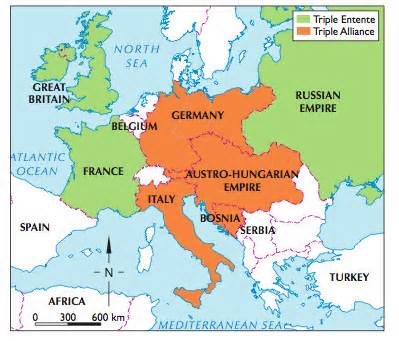World War I
Part 1: Before the War World War I was a global conflict on a massively lethal scale, involving battles and countries in most continents. The death toll for the four-year war topped 9 million. Called the Great War when it happened, the war was the culmination of a series of intersecting alliances and desires for expansion, most stemming from the end of the Napoleonic Wars, for which the Congress of Vienna sealed the deal. Napoleon Bonaparte met his final defeat at Waterloo on June 18, 1815. As a result, the great powers of Europe gathered to cement a peace.
A series of revolutions in 1848 sent shockwaves through the major powers for a year or so. A series of wars in the second half of the 19th Century created more upheaval. Most notable of these was the Crimean War, a struggle between Russia on one side and several of the major European powers on the other. The unifications of both Germany and Italy in 1871 raised alarm bells in the other major European countries, most notably France. The unifications came in the midst of the Franco-Prussian War, a major victory for the Germanic states. Prussia had, a few years earlier, scored another quick victory, against Austria, which resulted in the devolution of the Austrian Empire into the Dual Monarchy of the Austro-Hungarian Empire. 
From these struggles, Germany emerged as a major power, in some ways even more powerful than France, Russia, or Great Britain. Hemmed in by the newly created Germany and Italy, Austria-Hungary sought to expand southward, in the Balkans. Neighboring Serbia had expansion designs of its own. The competing desires resulted in cries for assistance. Austria-Hungary had originally formed the League of Three Emperors, with German Kaiser Wilhelm I and Russian Tsar Alexander II. Russia abandoned the League of Three Emperors and pledged its loyalty instead to Serbia, promising to attack whoever declared war on Serbia. Germany and Austria-Hungary pledged to support each other and joined with Italy to form the Triple Alliance. In response, France and the United Kingdom patched up their longstanding differences enough to form the Entente Cordiale and then joined with Russia to form the Triple Entente. In addition, the U.K. had a mutual defense treaty with Belgium. |
|
Social Studies for Kids
copyright 2002–2026
David White



 As its name suggests, the gathering took place in Vienna. After a series of negotiations, the major powers emerged with agreements that, among other things, enlarged some powers at the expense of others, in an attempt to maintain a balance of power in Europe.
As its name suggests, the gathering took place in Vienna. After a series of negotiations, the major powers emerged with agreements that, among other things, enlarged some powers at the expense of others, in an attempt to maintain a balance of power in Europe. 
